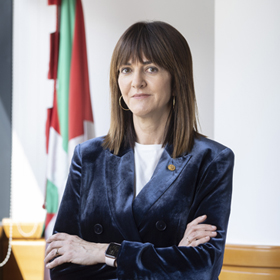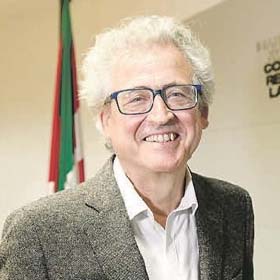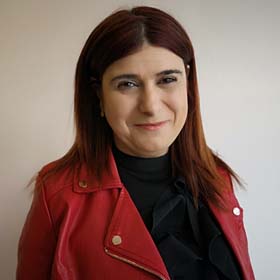V Employment Congress 2022

Welcome
The Employment Congresses of the 2020-2024 legislature are organised in line with the Governance Programme of the Department of Labour and Employment and its policy planning instruments.
Since I took over responsibility for the Ministry of Labour and Employment in 2020, we have organised three Employment Congresses in the Basque Country. The first, under the slogan “Building the Basque Employment System”, was the starting point to integrate all the agents involved in this field in designing employment policies. The second, entitled “Inclusive and Quality Employment for a New Social Contract”, focused on the need to establish quality employment as a premise of this new social contract, defining the path towards this goal through the drafting of the Basque Employment Strategy 2030 (EVE) and the Strategic Employment Plan 2021-2024.
Continuing this logical series, the V EMPLOYMENT CONGRESS - “Transforming Basque Employment Policies for Decent Jobs in a Sustainable and Competitive Economy” presents the answers we are giving to the current economic and structural challenges of Basque public policies from our own perspective but aligned with international and European standards.
Changing.

With this idea “strength”, 2022 is the year for the implementation of actions, research and experimentation, the development of new instruments for innovation and evaluation, the implementation of programmes that help to remove the barriers that vulnerable people face in accessing employment; in short, the provision of responses to the challenges defined in previous years and the fulfilment of the Basque Employment Strategy (EVE) by 2030.
The issues to be addressed at this V Employment Congress represent the cornerstone of our government’s goals: the legislative structuring of the Basque public employment policy for the coming years and the tackling of critical, recurrent, and structural issues that hinder equal opportunities and are the “bottlenecks” or barriers for access to quality employment.
Idoia Mendia Cueva
Second Deputy First Minister and Minister of Labour and Employment
About the Congress

This year’s Employment Congress will be attended by renowned experts in the field of employment, who will deliver keynote speeches and/or take part in the thematic discussion panels. It will last two consecutive days, with 11 public events consisting of 7 presentations and 4 round tables.
DAY 1 will be reserved for 4 presentations and 1 discussion panel. The keynote speech will deal with the key factors operating in the international and Basque labour markets and the possible “structural nature” of the successive circumstantial changes (2008 crisis, pandemic, war in Ukraine...).
This will be followed by a presentation on the subjective right to employment policies for decent employment, which will delve into the rationale of the subjectivity of this right and its materialisation in services or programmes available to people seeking public employment services.
It will continue with two brief presentations on current legislative initiatives on employment: presentation of the Draft State Employment Law and of the Preliminary Draft of the Basque Employment Law, initiatives to organise and optimise the management of public employment policies. In the Basque case, as a tool for structuring the institutional framework that operates in the field of employment initiatives, with a view to an in-depth improvement of the employment system and services and focusing on Basque citizens. This legislative project will be an unprecedented historical milestone and will lay the solid foundations for decent, quality employment through public employment policies.
Then, to conclude the first day, a discussion panel will be organised to assess and analyse public employment policies, their alignment at national and regional levels and the influence of legal frameworks on the effectiveness and efficiency of the employment system.
DAY 2 will begin with a presentation and a discussion panel on the demographic challenge of labour replacement due to the need to replace and manage the ageing of large population groups in the next 5 to 10 years. This is undoubtedly one of the main challenges facing most European societies.
This will be followed by a presentation on advanced information systems for public employment policies. Information, not only as a prospecting tool, but also to prevent and predict services and resources for the users of employment services. Information seen as a new service in the portfolio of services provided by Lanbide-Basque Employment Service and the Basque Employment Network.
Thirdly, a panel discussion on Employment and Social Inequality will address the barriers to employment faced by large groups of the population and the potential of employment and employment policies to redress social inequalities and promote employment opportunities to move towards a more egalitarian and inclusive society.
The fourth presentation will address a prospective effort by looking to the future of employment. Given the uncertainties we are experiencing: geopolitical, health, climatic, technological changes, demographic challenges, the devaluation of the value of labour income compared to capital income, automation as a risk or as an opportunity... Is the duality of the labour market inevitable (high-low skills, high salaries-workers)? Issues for reflecting and theorising on a possible paradigm shift with regard to employment as we know it today.
We will end with a discussion panel on shared findings among the members of the Scientific Advisory Committee of the V EMPLOYMENT CONGRESS. Their contributions will take stock of the topics discussed and will provide guidelines and proposals for future action programmes.
Topic
 EMPLOYMENT, DIGITAL TRANSFORMATION AND SUSTAINABLE COMPETITIVENESS
EMPLOYMENT, DIGITAL TRANSFORMATION AND SUSTAINABLE COMPETITIVENESS
This presentation will outline recent research by the Joint Research Centre of the European Commission on the impact that digital transformation is having on employment. In particular, evidence will be presented on employment automation (replacement of human labour by machines), on the digitisation of processes (use of digital devices at work) and on the use of algorithms to manage employment relationships (algorithmic management). The consequences of these phenomena on employment in Europe will be discussed, and the presentation will conclude with some thoughts on the relationship between these processes and the ecological transition at European level.
 THE RIGHT TO DECENT JOBS AND SUBJECTIVE RIGHTS IN PUBLIC EMPLOYMENT POLICIES
THE RIGHT TO DECENT JOBS AND SUBJECTIVE RIGHTS IN PUBLIC EMPLOYMENT POLICIES
The right to work (Art. 35.1 EC) does not include access to a specific job, as companies cannot be obliged to hire (Art. 38 EC). However, we are dealing with a fundamental human need, related to people’s dignity and the free development of their personality (Art. 10.1 EC). The Constitution itself acknowledges the problem, calling for a “full employmentoriented policy” (Art. 40.1). European law (CSER and PEDS) recognises, at least, the right for the State to support unemployed people in their search for jobs. The shaping of this “new” right is crucial if we are to comply with constitutional and international goals, and the Autonomous Communities can make progress in this regard, as they have the powers to do so.
 DRAFT STATE EMPLOYMENT LAW
DRAFT STATE EMPLOYMENT LAW
Presentation of the State Employment Bill. A mainstream standard that improves the training and qualifications of wage earners and their initial situation in companies, and which addresses the entire wage-earning population. This includes workers, the unemployed, the working population and the self-employed. The new bill aims to respond to the needs of the labour market and to combat its structural weaknesses, such as unemployment or youth unemployment.
 PRELIMINARY DRAFT OF THE BASQUE EMPLOYMENT LAW
PRELIMINARY DRAFT OF THE BASQUE EMPLOYMENT LAW
Presentation of the Preliminary Draft of the Basque Employment Law as a tool to structure the Basque institutional framework and radically improve the employment system and services for Basque citizens. A legislative project that will be an unprecedented historical milestone and will lay the solid foundations for decent, quality employment promoted through public employment policies.
 PANEL: PUBLIC EMPLOYMENT POLICIES AND LEGISLATIVE ACTION
PANEL: PUBLIC EMPLOYMENT POLICIES AND LEGISLATIVE ACTION
A discussion panel to assess and analyse public employment policies, their alignment and coordination at national and regional levels, and the influence of legal frameworks on the effectiveness and efficiency of the employment system. The goal of the discussion panel is, on the one hand, to analyse the way in which employment principles and policies are transposed into regulatory frameworks and articulated into a set of enforceable rights for individuals and correlative obligations and responsibilities for public administrations, and, on the other hand, to reflect on the need and the way to align and coordinate the various levels of action within an integrated and coherent system, without prejudice to the autonomy and the specific powers of each public administration.
 “REFRAMING AGEING AND WORK”
“REFRAMING AGEING AND WORK”
The demographic challenge of labour replacement owing to the need to replace large groups of the population in the next 5 to 10 years. This is undoubtedly one of the main challenges facing most European societies in our region.
 PANEL: THE GENERATIONAL CHANGEOVER
PANEL: THE GENERATIONAL CHANGEOVER
Age management and intergenerational collaboration. Inclusive and fair generational labour replacement: equitable working conditions for seniors and young people. Entrepreneurial change-over: knowledge and business transfer.
 THE VALUE OF KNOWLEDGE TO MEET THE CHALLENGES OF THE LABOUR MARKET OF THE FUTURE. ADVANCED INFORMATION MANAGEMENT
THE VALUE OF KNOWLEDGE TO MEET THE CHALLENGES OF THE LABOUR MARKET OF THE FUTURE. ADVANCED INFORMATION MANAGEMENT
Over the last ten years, the labour market has undergone radical changes, and the effect is quite evident: new jobs are emerging, and the skills required for existing jobs are changing; there is an increasing mismatch between demand and supply; the risk of exclusion from the labour market of the “most vulnerable” individuals is growing. The speed at which these phenomena are changing the dynamics of the labour market requires continuous changes and the ability to identify key factors in “real time” to support decision-making by institutions, organisations, and individuals.
In such a scenario, Big Data insights and artificial intelligence tools play a crucial role in supporting data-driven decision making.
 PANEL: EMPLOYMENT AND SOCIAL INEQUALITY
PANEL: EMPLOYMENT AND SOCIAL INEQUALITY
Is equal access to employment possible? Can employment policies contribute to an egalitarian and inclusive society? Ways of removing barriers to employment for people who objectively have greater difficulties due to sex, age, disability or other social or cultural discrimination factors.
 THE FUTURE OF EMPLOYMENT. Are developments and changes in the economy and society leading to a new employment paradigm?
THE FUTURE OF EMPLOYMENT. Are developments and changes in the economy and society leading to a new employment paradigm?
Automation as a risk and an opportunity for employment. What are we talking about when we refer to the mismatch between the staffing needs of companies and the skills of jobseekers? Are we moving towards a polarisation of the labour market between highly skilled people with quality jobs and low-skilled people with insecure jobs?
An anticipatory-projective analysis looking into the future of employment, considering the uncertainties we are experiencing (geopolitical, health, climatic, technological, demographic changes), the decline in labour income compared to capital income, questions for thought and theorising on a possible paradigm shift in employment as we know it today.
 SHARED CONCLUSIONS
SHARED CONCLUSIONS
Discussion panel on shared findings among the members of the Scientific Advisory Committee of the V EMPLOYMENT CONGRESS. Their contributions will take stock of the issues discussed and provide guidelines and proposals for future action programmes.
Programme
DAY 1: 27/10/2022
Host: EVA DOMAIKA ANSOLA
9.15 • 10.00. OPENING CEREMONY
Marisol Garmendia Beloqui. Second Deputy Mayor and Councilor for Economic and Employment Impulse, Ecology and Public Health of the City Council of Donostia / San Sebastián.
Jabier Larrañaga Garmendia. Regional Councilor for Economic Promotion, Tourism and Rural Environment of the Regional Council of Gipuzkoa.
Idoia Mendia Cueva. Second Deputy First Minister and Minister of Labour and Employment.
10.00 • 10.45. KEYNOT SPEECH: “EMPLOYMENT, DIGITAL TRANSFORMATION AND SUSTAINABLE COMPETITIVENESS”
Mikel Landabaso Álvarez. Director for Growth and Innovation at the Joint Research Centre of the European Commission.
10.45 • 11.30. PRESENTATION: “THE RIGHT TO DECENT JOBS AND SUBJECTIVE RIGHTS IN PUBLIC EMPLOYMENT POLICIES”
Guillermo Escobar Roca.Professor of Constitutional Law at the University of Alcalá (Madrid).
José Luis Gil y Gil. Professor of Labour Law at the University of Alcalá (Madrid).
11.30 • 12.00. COFFEE BREAK
12.00 • 12.45. “LEGISLATIVE INITIATIVES IN THE FIELD OF EMPLOYMENT” A section dedicated to the presentation of the Draft Spanish Employment Law and the preliminary draft of the Basque Employment Law
PRESENTATION 1 (12:00 to 12:20): “DRAFT STATE EMPLOYMENT LAW”
Gerardo Gutiérrez Ardoy. Director General of the State Public Employment Service (SEPE).
PRESENTATION 2 (12:20 to 12:40): “PRELIMINARY DRAFT OF THE BASQUE EMPLOYMENT LAW”
Alfonso Gurpegui Ruiz. President of the Basque Industrial Relations Council.
12.45 • 13.45. DISCUSSION PANEL: “PUBLIC EMPLOYMENT POLICIES AND LEGISLATIVE ACTION”
MODERATOR: Tomás Arrieta Heras. President of the Basque Industrial Relations Council.
PARTICIPANTS:
Luz Rodríguez Fernández. PhD in Law from the University of Valladolid and Lecturer in Law. Former Secretary of State for Employment at the Spanish Ministry of Labour and Immigration.
José Jaime López Cossío. Employment and training consultant. Director of Technical Assistance for the Cities for Employment Forum.
Iñigo Arteche Hernández. Project Manager and partner of IKERTALDE grupo consultor.
DAY 2: 28/10/2022
9.00 • 9.30. PRESENTATION: “REFRAMING AGEING AND WORK”
Ruth Finkelstein. Executive Director, Brookdale Center for Healthy Aging and Professor of Urban Public Health. Hunter College / CUNY (New York).
9.30 • 10.30. DISCUSSION PANEL: “INCLUSIVE GENERATIONAL CHANGEOVER IN THE WORKPLACE IN ORGANISATIONS” Practical approach. Solutions to challenges
MODERATOR: Iñigo Calvo Sotomayor. Lecturer and researcher at Deusto Business School-Deusto University, and Co-Editor-in-Chief of the scientific journal Boletín de Estudios Económicos (Economic Studies Bulletin).
PARTICIPANTS: AGE MANAGEMENT IN ORGANISATIONS:
Mercedes Oleaga Páramo. Senior expert at ORKESTRA- Basque Institute of Competitiveness.
Gotzon Bernaola Ariño. General Coordinator for Business Innovation at the Basque Innovation Agency - INNOBASQUE. BUSINESS TRANSFERS.
Susana González Rómulo. Director General for Employment. Provincial Council of Bizkaia.
10.30 • 11.00. PRESENTATION: “THE VALUE OF KNOWLEDGE TO MEET THE CHALLENGES OF THE LABOUR MARKET OF THE FUTURE. ADVANCED INFORMATION MANAGEMENT”
Mario Mezzanzanica. Vice-Rector for Higher Education and Work Placement University of Milan Bicocca. Head of the Department of Statistics and Quantitative Methods. Scientific Director - CRISP Inter-University Centre for Research in Public Services. Department of Statistics and Quantitative Methods.
11.00 • 11.30. COFFEE BREAK
11.30 • 12.45. DISCUSSION PANEL: EMPLOYMENT AND SOCIAL INEQUALITY
MODERATOR: Sara de la Rica Goiricelaya. Professor of Economic Studies at the University of the Basque Country (UPV/EHU). Director of ISEAK.
PARTICIPANTS::
Sergio Torrejón Pérez. Economic Analyst at the European Commission’s Centre for Public Policy Research.
Carlos Martín Urriza. Lecturer in the Faculty of Economics at the University of Alcalá de Henares. PhD in Economics from the Complutense University of Madrid.
Raquel Sebastián Lago. Senior Researcher in the School of Economics and Business Administration at the Complutense University (Madrid).
Antonio González González. Economist. General Secretary of Employment (2006-2008) of the Ministry of Labour. Member of the Economic and Social Council of Spain.
12.45 • 13.30. PRESENTATION: “THE FUTURE OF EMPLOYMENT”, “Are developments and changes in the economy and society leading to a new employment paradigm?”
Cristina Garmendia Mendizabal. President of the COTEC Foundation for innovation. Former Minister of Science and Innovation. Spanish Government.
13.30 • 14.15. DISCUSSION PANEL ON SHARED CONCLUSIONS
MODERATOR: Fernando Fantova Azcoaga. Social Consultant.
PARTICIPANTS:
Fernando Consuegra Revuelta. Member of the Scientific Committee, General Coordinator of SARTU TALDEA.
M.ª Jose Aranguren Querejeta. Member of the Scientific Committee, Managing Director of ORKESTRA.
Iñigo Arteche Hernández. Member of the Scientific Committee, Project Manager and partner of IKERTALDE.
Iñigo Calvo Sotomayor. Member of the scientific committee. Lecturer and researcher at the Deusto Business School. Coeditor of the scientific journal Boletín de Estudios Económicosa.
Sara de la Rica Goiricelaya. Member of the scientific committee. Professor of Economics at the University of the Basque Country (UPV/ EHU). Director of ISEAK.
14.15. CLOSING CEREMONY.
Francisco Pedraza Moreno. Director of Employment and Inclusion of the Department of Labour and Employment of the Basque Government.
Speakers and Panellists
OPENING
HOST
SPEAKERS AND PANELLISTS
CLOSING CEREMONY
Scientific Committee
Venue and Dates
The V Employment Congress will be held on the 27th and 28th of October at the Kursaal Conference Centre in Donostia / San Sebastian.
The Kursaal Conference Centre is located opposite Zurriola beach, in the Gros district, near the mouth of the Urumea River and is only a five-minute walk from the old quarters. It is linked to the city centre by the Zurriola Bridge, also known as the Kursaal Bridge.
If you come to the Congress by car, the Kursaal has its own car park with direct access to the Congress Hall. There are also two public car parks in the immediate vicinity, less than a fiveminute walk away. As for getting around the city, you won’t need to take a car or bus, as you can reach the city centre easily and comfortably on foot.
https://www.kursaal.eus/en/kursaal-congress-centre/how-to-get-here/

































